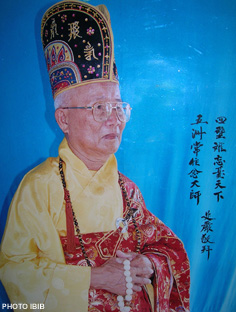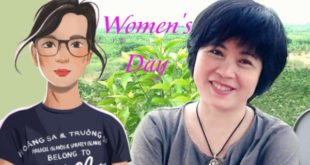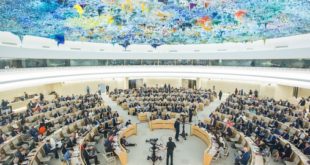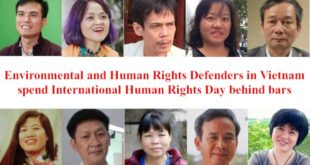“I have lived without a home, will die without a grave,
I walk without a path and am imprisoned
without a crime”
(Thich Huyen Quang)
The 4th Supreme Patriarch Thich Huyen Quang of the Unified Buddhist Church of Vietnam (UBCV), who passed away on 5th July at the Nguyen Thieu Monastery in Binh Dinh, was one of Vietnam’s most loved and respected spiritual leaders. He was also a determined opponent of tyranny in all its forms. For his uncompromising determination to stand firm, he paid a high price, spending over half his life in prison, internal exile or under house arrest under a succession of political regimes. Together with the Most Venerable Thich Quang Do, Thich Huyen Quang waged three decades of peaceful opposition to the Communist regime, becoming a symbol of the non-violent Buddhist movement for religious freedom and human rights. But he was also a great peacemaker and a man of dialogue, seeking every opportunity towards harmony and the healing of divisions in a Vietnam torn by war and conflicting ideologies. In April 2003, he was received in Hanoi by Vietnamese Prime Minister Phan Van Khai to discuss the situation of Buddhism. This is the first time a political prisoner had ever been received by a top government official in Communist Vietnam.
The International Buddhist Information Bureau wishes to make public some salient points of his life and work. More information and translation of his major texts will be posted on the IBIB website.

– Born on 19 September 1920 in Binh Dinh, secular name Le Dinh Nhan, Thich Huyen Quang was a brilliant scholar, winning first place in all his studies. He became a monk at the age of 12, and from a very young age, he vowed to combat injustice and win freedom for his country through the Buddhist ideals of salvation, tolerance and compassion.
In 1945, he took part in the resistance movement for independence against French colonial rule, and was Vice-President of the Buddhist Movement for National Salvation in Interzone 5. Arrested by the Viet Minh revolutionary forces in 1951 because he refused to submit religious activities to Communist control, he was imprisoned for 4 years in Quang Ngai, and released in 1954, just one month before the Geneva Agreement. In 1963, he took part in the Buddhist struggle against religious discrimination, calling for the abrogation of Colonial Decree No. 10. This Decree, adopted by the French and maintained by President Ngo Dinh Diem, recognized only Roman Catholicism as a “Church”, whilst Buddhism and all other religious were reduced to the status of a mere “association”. Along with thousands of Buddhists monks and nuns, he was arrested on the night of 20.8.1963 in a massive Police sweep launched by the Diem government in Hue and Saigon. He was released after the fall of the Diem regime on 1.11.1963. Decree No. 10 was then repealed, and Buddhism regained its religious rights. At a Congress in Saigon on 31.12.1963-4.1.1964, the Unified Buddhist Church of Vietnam (UBCV) regained its legitimate status. Ahered to by 80% of the population, the UBCV represents the 2000-year tradition of Vietnamese Buddhism, and it has the unique characteristic of uniting Buddhism’s two principle schools, the Northern School (Mahayana) and the Southern School (Theravada) into one congregation.
Thich Huyen Quang was appointed Secretary-general of the UBCV’s Executive Institute (Vien Hoa Dao, the Institute for the Dissemination of the Dharma) and Commissioner for Lay-Buddhist affairs.
During the Vietnam war, Thich Huyen Quang actively engaged in the Buddhist peace movement. He represented the UBCV at several international conferences, such as the World Conference of Religions for Peace (Japan, 1970), World Council of Churches (Geneva, 1972), the 2nd World Conference of Religions for Peace (Brussels, 1974). In 1974, he was appointed Vice-President of the UBCV’s Executive Institute Vien Hoa Dao.
It was after the communist victory on 30.4.1975 that Thich Huyen Quang embarked on his longest combat, and a cycle of imprisonment and exile that would last more than 26 years. After 1975, the authorities immediately launched a fierce campaign to suppress Buddhism in South Vietnam. UBCV property was confiscated, its institutions dismantled, its followers arrested. Repression reached such a height that in November 1975 in the province of Can Tho, twelve UBCV monks and nuns immolated themselves to call for an end to religious persecution. Thich Huyen Quang and the UBCV leadership strongly protested against the government’s policy of religious persecution. On 6.4.1977 he was arrested along with Thich Quang Do, Thich Thien Minh and other UBCV leaders, and detained in solitary confinement in Phan Dang Luu Prison in Saigon for 18 months. Following strong international protests, they were put on trial on 10.12.1978, sentenced to 2 years suspended sentence and house arrest, then released. The same year, Thich Huyen Quang and Thich Quang Do were nominated for the Nobel Peace Prize by Irish laureates Betty Williams and Mairead Maguire.
Having failed to suppress Buddhism by force, the government decided to place it under strict government control. In 1981, Vietnam founded the “Vietnam Buddhist Church”, controlled by the Communist Party’s Vietnam Fatherland Front to supplant the UBCV. Because they strongly protested this, Thich Huyen Quang and Thich Quang Do were both arrested on 25.2.1982 and sent into internal exile without any due process of law. Police simply said: “Your religious activities are tantamount to political activities”. Thich Huyen Quang was placed under house arrest at the remote Quang Phuoc pagoda in Quang Ngai Province, strictly forbidden to exercise religious activities. Conditions in Quang Ngai were extremely harsh. Thich Huyen Quang lived alone, without any disciples to assist him. During periods of frequent flooding, water inundated his room and he was obliged to sleep on the table. He had no access to medical care. Despite these harsh conditions, he continued to challenge the government on issues of religious freedom and human rights. He was adopted by Amnesty International as a prisoner of conscience in 1990, and declared a “Victim of Arbitrary Detention” by the UN Working Group on Arbitrary Detention in Geneva in 2001 and 2005.
On 23.4.1992, the UBCV’s 3rd Supreme Patriarch Thich Don Hau died in Hue. In his will, he appointed Thich Huyen Quang as his successor. In defiance of the government ban, Thich Huyen Quang staged a hunger strike and broke out of house arrest to attend the funeral at the Linh Mu Pagoda, where he was handed the official seal and solemnly pronounced him as the UBCV’s new leader. Before the late Patriarch’s coffin, he solemnly pledged: “Whatever hardships I encounter, I will never be shaken in my quest to re-establish the right to existence of the Unified Buddhist Church of Vietnam”.
The Communist authorities strongly opposed his appointment, and launched a virulent campaign against Thich Huyen Quang. Two “Top Secret” and “Ultra-Secret” Communist Party documents (Ref. 125/TUDV, 17.8.1992 and 106/PA 15-16, 18.8.1992) were issued by top VCP echelons denouncing the “malicious and illegal activities of Huyen Quang and his accomplices” and calling on Police and Party members to “spare no efforts in the struggle against Huyen Quang” and “chop off the arms and legs” (sic) of the UBCV. Police cut off the microphone, but Thich Huyen Quang’s eloquent Oration heard loud and clear.
Following the publication of these documents, Security Police launched a nation-wide crack-down against UBCV clergy and supporters, raiding homes and pagodas and confiscating Buddhist literature. Anyone found in possession of Thich Huyen Quang’s speeches was arrested. This sparked off renewed protests, culminating in a demonstration or 40,000 Buddhists for religious freedom in Hue on 24.5.1993, the largest ever public demonstration in Communist Vietnam.
On 20.11.1993, from house arrest, Thich Huyen Quang issued a landmark 12-point “Buddhist Proposal for Democracy and Human Rights”. This was a turning point for the UBCV. Whereas the Buddhists had limited their demands to religious freedom, Thich Huyen Quang called for fundamental political reforms such as free elections, a multi-party system, and the end of the Communist Party’s political monopoly.
“The abolition of Article 4 (of the Constitution on the VCP’s political mastery) does not imply the exclusion or the dissolution of the Communist Party… [it will] stimulate the participation of all sectors of the population, regardless of their political affiliations or religious beliefs [and] foster competition as a mutually reinforcing relationship, not as a race to oust one’s opponents. After all, whether our compatriots be communists or members of any other political party, they are first and foremost Vietnamese. Our common heritage of 5,000 years’ civilisation will form the basis for future dialogue and co-operation, and we will be bound together in one common aim – that of forging a place within the community of nations for a stable, flourishing and prosperous Viet Nam”.
Thich Huyen Quang’s Proposal defined the Buddhist vision of a just and open society, and underlined the UBCV’s resolve to struggle not only for religious freedom and Church independence, but for the fundamental rights and freedoms of Vietnamese people as a whole. He also stressed the role of Buddhism and religious movements this process:
“After 50 years of devastating war waged in the name of conflicting, imported ideologies, religious movements alone possess an unparalleled capacity to temper hatreds, defuse conflict and restore moral values in a society plunged in a spiritual and moral crisis. As such, they have a vital role to play in the reconstruction of our country…”.
The international community made numerous appeals for Thich Huyen Quang’s release. In May 1998, Nobel Peace Prize laureates H.H. the Dalai Lama (Tibet), Mairead Maguire (Ireland), François Jacob (France) and Jose Ramos-Horta (East Timor) formed a “Nobel laureates Committee for the release of Thich Huyen Quang and Thich Quang Do” and launched a joint appeal to the Vietnamese authorities. UN Special Rapporteur on Religious Intolerance, Abdelfattah Amor, asked to visit Thich Huyen Quang during an investigative mission to Vietnam, but the Hanoi authorities refused. In 1999, he received a visit from David Young, Political advisor to the US Embassy in Hanoi. He was the first Westerner Thich Huyen Quang had met in 17 years, since his internal exile in 1982. In 2003, the Czech Foundation “People in Need” awarded Thich Huyen Quang the “Homo Homini Prize”, under the auspices of former President Vaclav Havel. Unable to attend the ceremony in Prague, the prize was received by UBCV spokesman Vo Van Ai.
On the occasion of the 25th Anniversary of the end of the Vietnam War, in April 2000, Thich Huyen Quang sent an Open Letter to the Vietnamese leadership calling on them to proclaim 30th April (day of the Communist victory) a “Day of Contrition”, on which the Communist Party should publicly apologize for the hundreds of thousands of people who died under the Land Reforms in North Vietnam, the Tet Offensive in Hue, in the reeducation camps after 1975, or who perished as Boat People on the South China seas in their flight for freedom. Calling for “sacred rights for the dead, human rights for the living” Thich Huyen Quang also called for the repeal of Decree 31/CP on “administrative detention” and other national security laws.
In March 2003, suffering from a growth on his eye which was feared to be cancerous, he was allowed out of house arrest for the first time to receive treatment in Hanoi. In K hospital in Quan Su street, he received several diplomatic visits from the US Embassy, the EU delegation, as well as from Vietnamese officials such as the Chairman of the Vietnam Fatherland Front. He was told that the Prime Minister Phan Van Khai wished to meet him. At this time, 31 Members of the European Parliament and 37 Members of the US Congress wrote to the Vietnamese leadership calling for his immediate and unconditional release.
On 2 April 2003, he was received for talks by Prime Minister Phan Van Khai. This was the first time that a political prisoner was received by a high-ranking Communist official. Prime Minister Khai admitted that the Communist Party had made “mistakes” towards Buddhism and asked Thich Huyen Quang to “show compassion”. The meeting was widely covered by the State-controlled press, and seemed like a first step towards dialogue and closer understanding. However, the Prime Minister made no formal promises, and when Thich Huyen Quang asked about the re-establishment of the UBCV, Phan Van Khai replied: “We already have the VBC. One Buddhist Church is enough”.
Thich Huyen Quang made a stop in Hue on his way back to Quang Ngai on 7 April 2003. Although he had not announced his visit, crowds of Buddhists thronged to meet him at the station, and carried him shoulder-high through the crowds. Thich Huyen Quang was hailed as a leader both by UBCV Buddhists and dignitaries of the State-sponsored Vietnam Buddhist Church. Alarmed by this strong upsurge of public support, the authorities and Security Police immediately cut short his visit and placed Thich Huyen Quang back under house arrest in Quang Ngai. He was later authorized to travel to Saigon, accompanied by Security Police, where he met his friend and Deputy leader Thich Quang Do. Because of his frail health, the authorities allowed him to continue house arrest at the Nguyen Thieu Monastery in Binh Dinh, which he had founded himself, instead of the remote Quang Phuoc Pagoda in Quang Ngai.
On 1st October 2004, Thich Huyen Quang resolved to test Prime Minister Khai’s promises of dialogue and reconciliation by calling the first UBCV Assembly at the Nguyen Thieu Monastery in Binh Dinh. 60 senior UBCV monks from all over Vietnam attended the Assembly. The UBCV appointed new leadership of 41 UBCV monks and nuns, and devised strategies of action to re-establish the UBCV’s legitimate status and pursue the movement for religious freedom and human rights. As Thich Huyen Quang, Thich Quang Do and other UBCV leaders left the meeting in a mini-van to travel to Saigon, they were intercepted by Police and prevented from leaving Binh Dinh. Thich Huyen Quang and Thich Quang Do staged an immediate hunger strike in the van. As a result of their actions, and the strong international pressure which followed, the delegation was allowed to leave Binh Dinh. However, as they arrived at Luong Son, just 40 kilometres from Nha Trang, their vehicle was intercepted by Police. Thich Huyen Quang and Thich Quang Do were interrogated for 8 hours, then accused of “possessing State secrets” and placed under house arrest at their Monasteries, respectively the Nguyen Thieu Monastery in Binh Dinh and the Thanh Minh Zen Monastery in Saigon. Several other UBCV leaders were also detained and placed under house arrest without trial. Thich Huyen Quang was forcibly escorted back to Quang Ngai.
This brutal crack-down triggered off outrage in the international community. Two strong resolutions were issued almost simultaneously by the U.S. Congress (HR 427, 19.11.2003) and the European Parliament (20.11.2003) condemning the crack-down, commending the UBCV’s 2000-year tradition of tolerance and compassion, and calling for the immediate release of all UBCV leaders. This crackdown was one of the main factors that prompted the USA to place Vietnam on its blacklist of “Countries of Particular Concern” for gross religious freedom violations in 2004, and again in 2005. In the following period, many similar resolutions were adopted in the EP, US Congress and many national parliaments calling for the release of Thich Huyen Quang and Thich Quang Do, and for the right to existence of the banned UBCV.
From 2004-2008, the authorities maintained Thich Huyen Quang in virtual isolation at the Nguyen Thieu Monastery. He was prohibited from travelling, his communications cut, and all visits monitored. Security Police specifically prohibited him from received any visits from Thich Quang Do. Although Thich Huyen Quang was never formally indicted for “possessing state secrets”, the accusation was never lifted, and he was maintained under strict surveillance and control. Thich Quang Do was systematically arrested each time he tried to visit Thich Huyen Quang for the Lunar New Year, or during the Patriarch’s frequent periods of hospitalisation in Binh Dinh. Whereas US Ambassador Michael Marine and his wife visited the UBCV Patriarch in the Quy Nhon hospital in November 2004, Thich Quang Do and his UBCV delegation were intercepted by Police in Trang Bom, 50kms from Saigon, as they attempted to visit the Patriarch, and forcibly returned to Saigon.
On 21.2.2005, Thich Huyen Quang wrote an Open Letter to the Vietnamese leadership expressing his indignation that Vietnam continued to repress the UBCV, yet received with great pomp and ceremony the France-based Buddhist monk Thich Nhat Hanh and his delegation in Vietnam. He also refused Thich Nhat Hanh’s request to visit him at the Nguyen Thieu Monastery. He esteemed that Thich Nhat Hanh’s visit gave the international community a false impression of the situation of religious freedom in Vietnam.
Whilst maintaining Patriarch Thich Huyen Quang under isolation in Binh Dinh, the Vietnamese authorities stepped up efforts to entice or pressure him to integrate the State-sponsored Vietnam Buddhist Church and renounce the outlawed UBCV. Knowing Thich Huyen Quang’s aspirations for Buddhist unity, they tried to persuade him to play a unifying role by accepting the leadership of the State-sponsored VBC. However, well aware of the VCP’s real intentions to suppress the UBCV, Thich Huyen Quang systematically refused all these proposals. On 5.5.2007. the Vice-Minister of Public Security Nguyen Van Huong visited him in Binh Dinh. The meeting was widely reported in the State-controlled press as a positive gesture by Thich Huyen Quang to the communist regime. In reality, as Thich Huyen Quang told IBIB Director Vo Van Ai, the meeting was purely formal. “Don’t believe what you read in the communist press”, he said. The Vice-Minister offered Thich Huyen Quang a high post in the State-controlled VBC, but he refused. On 29.8.2007, Major-general Tran Tu from the Ministry of Public Security’s Department A41 (on religious and security affairs) visited Thich Huyen Quang in Binh Dinh. After denouncing Thich Quang Do’s activities in support of farmers and peasants demonstrating against State confiscation of land, he warned Thich Huyen Quang that the Stare perceived such acts as “fomenting rebellion”. He prohibited Thich Huyen Quang from receiving Thich Quang Do or organising any UBCV meetings in Binh Dinh, Major-general Tran Tu invited Thich Huyen Quang to accept the appointment of Head of the [State-sponsored] Vietnam Buddhist Church at its 6th Congress in Hanoi in December 2007, and attend the International UN Day of the Vesak hosted by Hanoi in May 2008. The UBCV Patriarch refused. In December 2007 he again received an invitation to the VBC Congress and the UN Vesay Day in Hanoi, relayed by local Communist officials. He refused, stating that an invitation delivered by the Police was “more like a Police summons that a genuine invitation”.
In his last Message to the Buddhists community, issued on the Vesak (Buddha’s Birth) in May this year, Thich Huyen Quang stressed Buddhism’s firm commitment to freedom and human rights:
“Buddhism does not turn its back on society. On the contrary, Buddhism boldly confronts society’s challenges, restoring peace to societies where repression rules, false thinking dominates and people are driven into perpetual conflict”.
“We can see that Vietnam’s economic development has brought some improvements. But at the same time, the poverty gap is rocketing. This is not just the gap between rich and poor, but the gulf between the rulers and the ruled. Vietnam’s policies have produced a “rich country with poor people”, the very contrary of the prosperity that the government’s slogans claim”… “In terms of human freedoms, we have nothing – all basic rights and liberties are denied. The religious communities cannot act freely, and as a result, social problems are persistent and increasing. It is impossible to bring enlightenment where poverty and lack of freedom prevail”.
“We have virtually lost the Spratly and Paracel islands, to the total indifference of our government. How starkly their attitude contrasts with that of the Dinh, Le, Ly and later Le, Ly and Tran dynasties, where the kings, great Zen masters, Buddhists and the entire population shared a common determination to defend and preserve the nation. Thanks to their efforts to defend our country, the Vietnamese people have a land on which to live. Thanks to their efforts to maintain our independence, the Vietnamese people have preserved their identity and developed the spiritual and cultural values that distinguish Vietnamese civilization today”. By developing their spirituality and fulfilling Buddha’s teachings, he wrote, Buddhists could serve their country and help to “ensure that the Vietnamese people will never again be slaves”.
“Buddha’s teachings cannot flourish in a country reduced to slavery; human beings cannot enjoy happiness if they are poor and oppressed. The ultimate vow of all Buddhists is to emerge wherever such suffering exists, and show all beings the Path to liberation”.
This post is also available in: Vietnamese
 Quê Me Quê Me: Action for democracy in Vietnam & Vietnam Committee on Human Rights
Quê Me Quê Me: Action for democracy in Vietnam & Vietnam Committee on Human Rights




